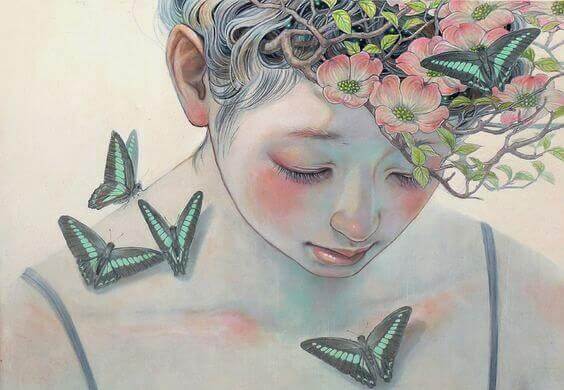The deepest wounds do not come from knives, they come from words, lies, absences and lies, are these wounds that are not seen on the skin, but that hurt, that bleed, because they are made of tears of sadness, those that flow in intimacy and with silent bitterness?
The wounded man drifts a while later, when time sews these fractures a little, the person notices something, realizes that he has changed, still feels vulnerable and sometimes makes the worst possible mistake: creating a strong barrier of himself. -protection. It embeds distrust, then the thread of anger, and even the closure of grudges. Defense mechanisms to avoid being wounded again.
- From now on no one will be able to live forever defensively.
- We cannot become tenants of the feathers of solitude.
- Expats of happiness.
- Managing suffering is a heartbreaking and conscientious work that.
- As Jung would say.
- Forces us to rediscover our own shadow.
- To regain self-esteem.
Offering this union again is something that no one can do for ourselves, it is a delicate gesture of solitude that we will make almost like an initiation, only those who can face the demon of their traumas with courage and determination will be able to leave the forest of renewed poisonous thorns. The person emerging from this hostile scenario will no longer be the same person.
It’s going to be stronger
The balm of the wounded mind is balance. It is to be able to take the step towards acceptance to release everything that weighs, all that hurts, is to change this fragile and wounded skin for a harder and more beautiful skin that shelters the heart tired of the cold, but you have to be. She considered that there are many underground roots that continue to feed the root of pain, branches that, far from draining the wound, feed it.
Hating our own vulnerability is, for example, one of those nutrients. There are those who deny it, who react to this apparent weakness. We live in a society that prohibits us from being vulnerable.
However, a balm for the wounded mind is to accept its most fragile parts, recognizing itself wounded, but deserving of finding peace of mind, happiness, the important thing is to love each other enough to accept these torn parts without resentment, without becoming renegades of their own and others’ affection.
Resentment is another root that nourishes the wounded mind. Believe it or not, this emotion tends to “intoxicate” our own brains to the point of changing the way we think. Prolonged resentment changes our vision of life and people. No one can find balm, in this very cage.
These deep, invisible wounds will forever inhabit the depths of our being, yet we have two choices. The first is to always be captive of pain; the second is to remove the shell to accept and feel its own vulnerability; only in this way will reinforcement, learning and a liberating step come for the future.
We’re dragging all our broken pieces. Our pieces were lost in these puzzles that we couldn’t finish. A traumatic childhood, a painful romantic relationship, the loss of a loved one?Day after day, we find ourselves unansested with these invisible wounds. The personal battles each has won now define our profile. Doing this with courage and dignity ennobles us. This makes us, before our eyes, much more beautiful creatures.
We can see each other again. The broken corners of our own interior take us completely away from that inner skeleton on which our identity, our value, our own concept, was based. We are like fuzzy souls who are not recognized in the mirror or who are persuaded that they no longer deserve to love or be loved again.
In Japanese, there is an expression, “Arigato zaish”, which literally translates as “thank you hope”. However, for a long time he received another very interesting connotation in personal growth. This shows us the subtle capacity of human beings to transform suffering, resentment and bitterness into learning.
Is it possible that throughout our lives we have been buried?With the veil of pain caused by these invisible wounds, but remember: we are seeds. Even in the most unfavorable situations we can get up to say aloud ‘Arigato zaish’.
Images courtesy of Miho Hirano.

